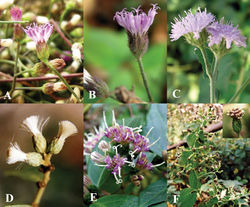Cyanthillium patulum
| Notice: | This page is derived from the original publication listed below, whose author(s) should always be credited. Further contributors may edit and improve the content of this page and, consequently, need to be credited as well (see page history). Any assessment of factual correctness requires a careful review of the original article as well as of subsequent contributions.
If you are uncertain whether your planned contribution is correct or not, we suggest that you use the associated discussion page instead of editing the page directly. This page should be cited as follows (rationale):
Citation formats to copy and paste
BibTeX: @article{Bunwong2014PhytoKeys37, RIS/ Endnote: TY - JOUR Wikipedia/ Citizendium: <ref name="Bunwong2014PhytoKeys37">{{Citation See also the citation download page at the journal. |
Ordo: Asterales
Familia: Asteraceae
Genus: Cyanthillium
Name
Cyanthillium patulum (Aiton) H.Rob. Proc. Biol. Soc. Washington 103(1): 252. 1990. – Wikispecies link – IPNI link – Pensoft Profile
- Conyza patula Aiton., Hortus Kew. 3: 184. 1789.
- Vernonia patula (Aiton) Merrill, Philipp. J. Sci., C, 3: 439. 1909.
Type
China, Cult. 1758, Philip Miller s.n. (not seen). Fig. 7C.
Description
Annual herbs, 1–2 m tall. Stems erect, conspicuously ribbed, white sericeous. Leaves 3–10 by 2–5 cm, elliptic to ovate or slightly rhombic, margin serrate or slightly sinuate, apex acute or obtuse, base attenuate, chartaceous; upper surface puberulous glandular;lower surface sericeous with T-shaped hairs and capitate glands; lateral veins 4–8-paired; petioles up to 2 cm long. Capitulescences terminal or axillary, paniculate. Capitula broadly campanulate or subglobose, 7–10 mm long, pedunculate. Receptacle flat, 2–3 mm in diam., glabrous. Involucres hemispherical, in 4–5 series, 6–7 mm long, 5–6 mm in diam. Phyllaries imbricate, light green, margin piliferous, outer surface arachnoid glandular; the outer and the middle ones lanceolate, apex acuminate or aristate; the inner ones lanceolate to oblong, apex acuminate. Florets 80–120; corollas funnelform, purple or white, corolla tubes 4–5 mm long; corolla lobes ca. 2 mm long. Anthers 1.5–2 mm long, apical appendage acute, base obtuse. Styles purple, 4–5 mm long, branches 1–1.5 mm long. Achenes turbinate, 1–1.5 mm long, 5-ribbed, glandular. Pappus in 1 series of bristles, 2–3 mm long, deciduous.
Distribution
Thailand: Nan, Sukhothai, Mukdahan, Buri Ram, Ubon Ratchathani, Bangkok, Samut Prakan, Prachin Buri, Surat Thani. China, India, Malay Peninsula, Laos, Myanmar, Philippines, New Guinea.
Specimens examined
Thailand, Ubon Ratchathani, Chong Mek border crossing, 15°8.02'N, 105°28.01'E, 27 Oct 2007, S. Bunwong 341 (KKU, US); Nan, Chieng Klang, 28 Nov 1986, Y. Paisooksantivatana 1879-86 (BK); Sukhothai, 2 Nov, 1971, J.F. Maxwell 71-643 (BK, L); Mukdahan, Ban Wan, 6 Jun 1932, M.C. Lakshnakara 948 (BK, BM, K); Buri Ram, 24 Nov 1976, C. Phengklai et al. 3392 (BKF); Samut Prakan, 1 Feb 1970, J.F. Maxwell 70-19 (BK, L); Nakon Sawan, 1 Jul 1920, Vanpruk 1015 (BKF, K); Prachin Buri, Chakan, 30 Jan 1983, H. Koyama, H. Terao & Th. Wongprasert T-33138 (AAU, BKF, L); Surat Thani, Kiriras to Nikoon, 21 Oct 1970, S. Sutheesorn 1875 (BK).
Diagnostic characters
Cyanthillium patulum differs from Cyanthillium cinereum by having only single series of pappus, a 5-ribbed achenes without hair and a globose capitula.
Ecology
Open area in dry evergreen forest or secondary forest, alt. 0–100 m; flowering August to February.
Vernacular name
Mud Muang (หมุดม่วง).
Taxon Treatment
- Bunwong, S; Chantaranothai, P; Keeley, S; 2014: Revisions and key to the Vernonieae (Compositae) of Thailand PhytoKeys, 37: 25-101. doi
Images
|
